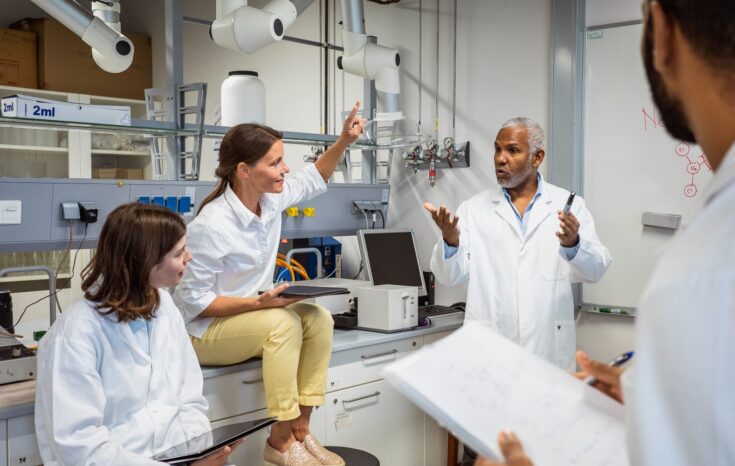Four research innovation teams will each receive £500,000 to work across disciplines on high-risk, high-reward projects towards improving outcomes of hard-to-treat cancers.
The projects were selected following a two-day ‘sandpit’ event designed to promote new conversations and create teams of researchers across scientific disciplines from clinical, biomedical, engineering, physical and data sciences.
The teams co-developed innovative ideas and solutions to advance cancer research including for prevention, diagnosis and treatment.
Awarded funding
The group projects will be led by:
Lauren Ford, Imperial College London
The team will develop techniques for the precision removal of brain cancer cells using a laser.
This technique could reduce the impact of treatment on normal cells as well as provide real-time data on the nature of the cancer, which can then be used to inform post-operative treatment.
Ben Newland, University of Cardiff
The team will research the use of a cryogel placed at the brain tumour removal site.
The cryogel will deliver drugs directly to the site, overcoming the blood-brain barrier and reducing the effects of drugs on non-targeted areas.
This project will be joint funded with Brain Tumour Research, the first such partnership between the Medical Research Council (MRC) and the charity.
Tim Witney, Kings College London
The team will take forward research on using artificial intelligence to read lung scans and more accurately predict whether a cancer is resistant to treatment.
This data will then be used to create targeted drugs that selectively kill treatment-resistant cancer cells.
Sara Valpione, The University of Manchester and The Christie NHS Foundation Trust
The team will explore ways to optimise engineered nanoparticle therapeutics for oesophageal cancer.
Researchers hope to target cells that hinder effectiveness of medicines that boost the immune system against cancer.
High-risk, high-reward
Science and Technology Secretary, Michelle Donelan, said:
While pioneering treatments have progressed enormously over the years thanks to world class researchers, cancer continues to impact on so many lives – whether through diagnoses or experiencing the heart-wrenching loss of a loved one.
By investing in high-risk but high-reward techniques – including artificial intelligence – we are backing our ambitious, world class researchers to build on generations of discoveries and give more people a fighting chance to live long and healthy lives.
Achieving real-world impacts
Dr Megan Dowie, MRC Head of Molecular and Cellular Medicine, said:
We look forward to supporting the teams towards achieving real-world impacts, both in a clinical setting and the real hope they may ultimately be able to offer to those suffering from some of the most challenging cancer diagnoses.
We were inspired by the success of the sandpit event.
The many new interdisciplinary connections formed over the two-days will have a lasting legacy of future collaboration of life and physical sciences researchers.
This will help achieve the step change we need to address hard-to-treat cancers with potential for translation to other types of cancer too.
Pump-priming grants
Additionally, two projects have been awarded a £50,000 pump-priming grant to generate preliminary data.
The funding will allow these teams to further the ideas developed at the sandpit for possible future funding.
The two projects will be led by:
Ljiljana Fruk, University of Cambridge
The team will develop engineered bacteria that can produce stroma reprogramming compounds and be activated and imaged by ultrasound.
It is hoped these bacteria could be used to change the tumour environment rather than kill cancer cells.
This could potentially avoid the need for highly toxic traditional cancer drugs and the development of drug resistance in patients.
Philippe Wilson, Nottingham Trent University
The team will develop a proof-of-concept lateral flow test for the early detection of brain tumour recurrence, suitable for future patient self-administration.

